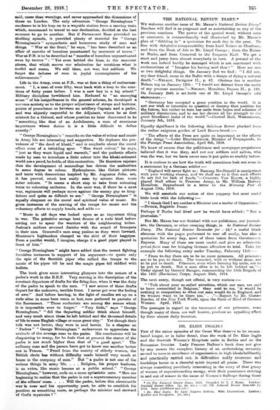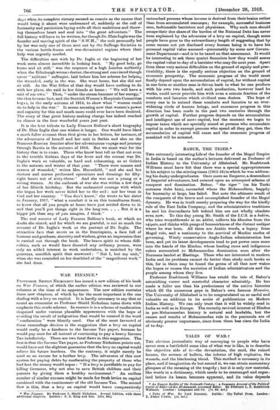DR. ELSIE INGLIS4
Fzw of the minor episodes of the Great War deserve to be remem- bered longer, or in fuller detail, than the work of Dr. Elsie Inglis and the Scottish Women's Hospitals units in Serbia and on the Rumanian frontier. Lady Frances Balfour's book does not give by any means the complete history of an undertaking certainly second to none in excellence of organization, in high ideals brilliantly and practically carried out, in difficulties nobly overcome and hardships borne in a cheerful spirit beyond all praise. There was always something peculiarly interesting in the story of that group of women of superabounding energy, with their passionate striving in and out of season in the cause of Women's Suffrage during those • (1) The National Review Diary, 1911). Compiled by L. J. Maxso. London : National Review Office. (2i. 6d. net.]—(2) The National Review Reminder Jot 1919. Same publishers and prie.. t Dr. Mile Inglie. By Lady Frances Balfour. With Illustrations, London; Hodder and Stoughton. Les. net.]
days when its complete victory seemed as remote as the means that would bring it about were undreamed of, suddenly at the call of humanity and patriotism laying aside all their ambitions and throw- ing themselves heart and soul into "the great adventure." The full history will have to be written, for though Dr. Elsie Inglis was the founder and moving spirit of the " S.W.H.," the unit personally led by her was only one of those sent out by the Suffrage Societies to the various battle-fronts and war-devastated regions where their help was urgently needed.
The difficulties met with by Dr. Inglis at the beginning of her work seem almost incredible in looking back. "My good lady, go home and sit still," was the response of a high London authority when the Edinburgh woman doctor, the sfrong and convinced though never " militant " suffragist, laid before him her scheme for helping the wounded, early in the war. She went home, but she did not sit still. As the War Office of that day would have nothing to do with her pleas, she said to her friends at home : "We will have a unit of our own." Then, " under the steam-hammer of her energy," the idea became fact, and the Scottish Women's Hospitals Committee begi-t, in the early autumn of 1914, to show what "women could do to help in the war." It seems amazing now that women's power and capacity for this and much more could ever have been doubted. The story of that great history-making change has indeed reached its climax in the four wonderful years just past.
It is the b3st tribute to Lady Frances Balfour's short biography of Dr. Elsie Inglis that one wishes it longer. One would have liked a much fuller aecoutit than that given in her letters, for instance, of the adventures of herself and her unit in Serbia and also on the Rumano-Russian frontier after her adventurous voyage and journey through Russia in the autumn of 1916. But we must wait for the history that is to come. Those who know best tell us that not even in the terrible Serbian days of the fever and the retreat was Dr. Inglis's work so valuable, so hard and exhausting, as at Galati in the autumn and winter of that year. "There were masses and masses of wounded," writes Mrs. Haverfield, "and she and her doctors and nurses performed operations and dressings for fifty- eight hours out of sixty-three." And she was not a young or a strong woman. At the outbreak of war she was within a few days of her fiftieth birthday. But the undaunted courage with which she began her work never failed her to the end ; nor her trust in God and her country. "You don't know," she wrote to her sister in January, 1917, "what a comfort it is on this tumultuous front, to know that all you people at home have just settled down to it, and that you'll put things right in the long run. . . . But it is a bigger job than any of you imagine, / think."
The real success of Lady Frances Balfour's book, at which no doubt she aimed, and for which we are grateful, is not so much the account of Dr. Inglis's work as the portrait of Dr. Inglis. The attractive fees that meats us in the frontispiece, a face full of humour and goodness, sincerity and wisdom, gives an impression that is carried out through the book. The brave spirit to whom diffi- culties, such as would have daunted any ordinary person, were only an added interest in work undertaken, is matched by the generous, unselfish spirit that answered : "Not I, but my unit," when she was reminded on her deathbed of the "magnificent work"
she had done. •



























 Previous page
Previous page